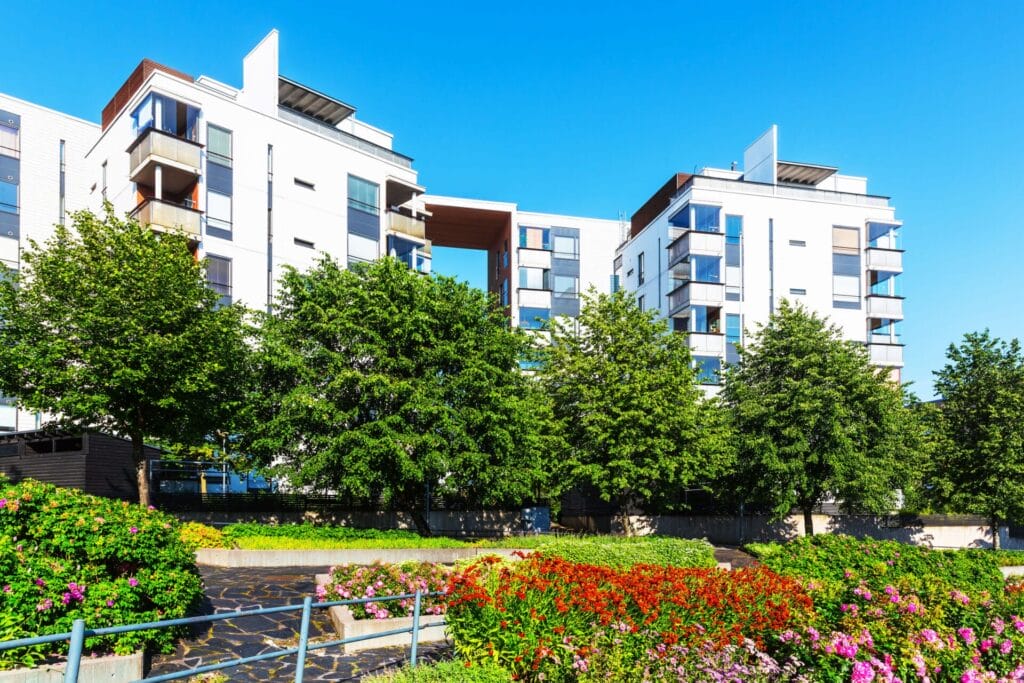Are co-op loans right for you?
Finding comfortable, affordable living in a major metropolitan area can be difficult. With so many people, and so little space, it seems impossible to find even a small apartment.
Co-ops, however, may present a wonderful option by providing comfortable living in a safe and secure building.
What is a Co-Op?
Co-ops, short for “cooperative,” is a type of apartment or condominium facility where the units are not individually owned, but instead the entire building is owned collectively by the residents, who form a corporation. The corporation owns the entire facility, including the interior, exterior, and common areas. To live in a co-op, you purchase a share in the corporation and are then allotted a living space.
These types of facilities are found in many areas, but are especially prevalent in crowded metropolitan cities. Washington D.C., Chicago, Atlanta, and Kansas City all hold co-op buildings, but it’s believed that the most co-ops, by far, are found in New York City. One section of the Bronx has actually been dubbed “Co-op City.”
Advantages of a Co-op
Co-ops have many advantages, both in comparison to traditional single-family housing, as well as condos. They offer the chance to have maintenance managed and conducted by someone else, freeing your time and energy for other activities; you won’t have to concern yourself with many of the time-consuming tasks that bother most homeowners.
Also, they provide housing options in crowded cities, areas where finding real estate can be almost impossible.
They have a highly selective application process (within the law, of course), so you know that neighbors have been vetted for income, criminal background, and other factors that are important to buyers. There are also tax benefits, as co-ops provide a variety of deduction opportunities.
How are Co-op Loans Different?
Co-ops are different from both condos and single-family housing, so the loans that secure these properties are different as well. When you purchase a house or condo, you are given a deed to the property; whether it’s a small unit in a condo building or hundreds of acres in the country side, you own a physical piece of property, which, in the event of a financial emergency, can be seized by the bank or lender if you are unable to repay the loan.
But with a co-op, you don’t have the same ownership structure. As an individual owner, you don’t own a specific unit in the building. In fact, you’re not an individual owner at all, but a member of the cooperative group. While a unit in the apartment becomes your legal residence, you don’t actually own the unit outright; it’s owned by the co-op.

Therefore, a co-op loan is actually a “share loan,” not a home loan. A home loan, to be bluntly obvious, lets you buy a home. A share loan, then, lets you buy a share in the co-op. Basically, it’s a loan that allows you to buy into the cooperative corporation.
Financing for a co-op involves approval from both the borrower and the co-op itself. In other words, the lender will not only take a look at your ability and reliability to repay the loan, they will also consider factors related to the building.
Generally, you will find that the loan process for a co-op takes longer than closing a loan for condos or traditional housing. This is because there are more parties involved in the overall process, and there tends to be more steps in the process as well. For example, co-op loans require an appraisal just like any other mortgage, but many lenders won’t order an appraisal, which costs a small fee, until you have been approved by the co-op board. Approval from the co-op can take weeks, which means you have to wait until the board does their work. It’s not unheard of for a co-op loan to take nearly three months to complete the closing process, so expect a long wait if you are seeking this form of financing.
Downpayment requirements vary by lender, but you can generally expect a 10% downpayment requirement. In some cases, you may be required to bring as much as 20% for the co-op loan. This is simply a way for lenders to compensate for the inherent risk associated with these types of properties.
Financing for co-op purchases, as we have alluded to already, is more complicated; not necessarily more difficult, just more layered. One complication is the fact that not every bank or mortgage lender services these loans, so you may have to consult multiple lenders just to find someone who can deliver financing. Once you find a bank or lending organization that can help, you may have to wait for the services of a specialized professional; not every agent within an organization is equipped and experienced in these loans.
Some co-ops have “underlying mortgages” as well, for which you will be responsible in addition to your co-op loan. An underlying mortgage is the loan taken out to make the original purchase of the building. While you are individually responsible for your co-op loan (or “share loan”), all members of the co-op are responsible for the underlying mortgage. This added payment will add to your cost of living and can impact your chances of approval.
However, once you find someone who can assist with your loan, the process for approval and verification is pretty standard. They will research your financial stability, credit scores, debt load, and other factors that impact your ability to repay a loan. In this regard, co-op financing is no different than financing for a condo or single-family home.
Helping with Your Next Purchase
If you are interested in a co-op, condo, or single-family home, contact our staff today. We have decades of experience in the lending industry, and we’ll do everything we can to ensure you get the right loan to fit your living needs and budget!


